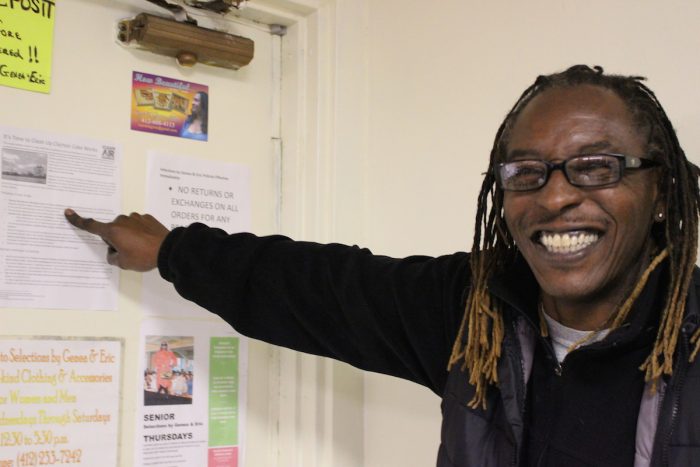Almost everyone you meet in Clairton knows someone who has gotten cancer at a young age. Usually it’s a close relative. Eric Webb was born and raised in Clairton. His mother, aunt and grandmother died from cancer and now his father has myeloma, a form of bone cancer. A former EPA employee himself, Webb alway assumed the agency was monitoring the pollution coming out of the plant and making sure it was safe. He learned that wasn’t the case when he attended his first public meeting about air quality in his town.
Julie Grant spoke to Webb and two others with Clairton roots who have attended air quality meetings to learn what kinds of things the citizens of Clairton are worrying about.
ERIC WEBB
It kind of took me by surprise. It’s a process and I’m learning through the process. This is new to me but I am going to learn as much as I possibly can. That was my first meeting, but now it’s got me into researching. That’s why I even have a sign on my front door about keeping Clairton clean. If there’s something I can do, I want to do it. You don’t want to be sitting by and watching it happen. This is not like a parade or anything. This is serious. And the mill could be a real common denominator to all of this.
I would feel bad as the owner of a company if I hired 100 people to work for me and I know they are working in a toxic environment that could possibly shorten their lives. These people have families, kids to raise. They just wanted a job and to have a nice life. They didn’t sign up for a job where you could get cancer in five years and it could kill you in ten. That’s just disturbing as humans. We care more about money than we do actual people.

Paula’s Lim’s mother was from Clairton and spent a lot of time here as a child. Although she doesn’t live there now, she’s gotten involved with the local movement to educate people about the Coke plant.
PAULA LIM
When I’m at a function in town everybody tells me so-in-son has cancer. Everyone I know is dying from cancer. And it’s frightening. What’s really prevalent in this area is asthma. So many friend I have here, their grandchildren have asthma. I belong to a group that interviews people who have harmed by this. And we have maybe 17,000 people on our list who have been harmed in some way – cancer, nose bleeds, death of their pets, turns their ponds black. It’s true. The industry will deny it but we see time after time that it’s true. It’s so unfair.
Three years ago when I was volunteering here I saw the gas company driving around their little trucks offering people $100 to frack under their homes. I knew it was coming and it wasn’t good. Who wants that in their backyard? It’s not a win situation for the citizens. They take the money and they’re off to Texas with the profits.
I love the people here. As long as they are willing to fight I’m going to fight alongside of them.
Barbara Boozer was born and raised in Clairton. She didn’t think much about pollution growing up, but now she’s started to learn about air quality. She’s concerned about the smoke she sees billowing out of the coke plant. And the fact that there’s no grocery store in town.
Barbara Boozer
I live close to the mill. My parents came from Columbia, South Carolina. My dad had six uncles come up to work in the mill and that’s how he came here. He worked in the mill and we went to the school here. To me, when I was growing up, it was a big place. And then when you get older you realize it’s a small town. But the main thing is we definitely need a grocery store. There’s no grocery store here.
When we grew up we looked at older people passing. Now it’s more younger people. And every time they pass it’s cancer. I’ve been going to the meetings about fracking now. There have been very good crowds at the meetings. And I will be here for all the meetings with my other two friends here.



